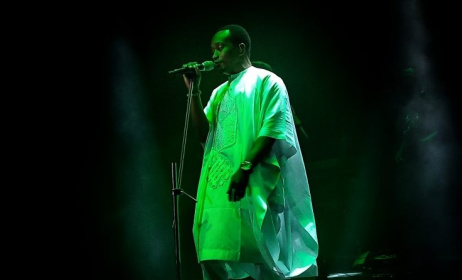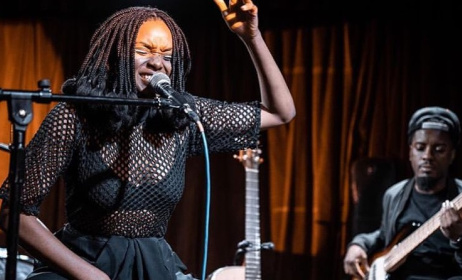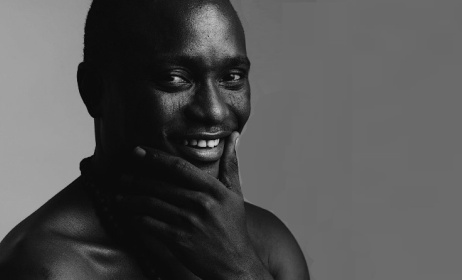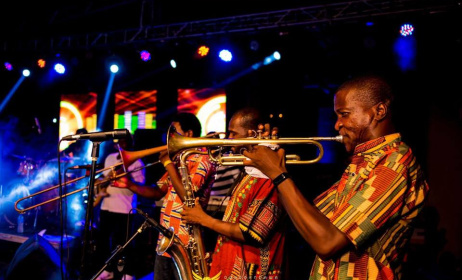Majek Fashek thrills Afropolitan Vibes
It is a longstanding ritual at the monthly Afropolitan Vibes concert in Lagos that more than one dancing lady shall at some point climb the stage. And so it was at 2015’s last concert that a skinny, diminutive lady got on first. A far cry from the more endowed women the crowd is used to, Ms Skinny more than made up for it by an impressive dance. The crowd loved it.
Soul singer Ayo Awosika had just left the stage and this interval of dance was familiar to the Afropolitan audience. This familiarity is at the heart of the Afropolitan Vibes appeal: the building of a family instead of fans. Every month the same people clamber up the steps—give or take the awkward but enthusiastic foreigner or returnee Nigerian—yet the excitement never wanes. How much of this due to a stifling Lagos environment that makes cooling-off imperative or the time between AV editions—30 days—is unknowable.
"He's parking," Ade Bantu informed the audience about the next performer. “So we are going to stall you with some music.” A beat went out, with the Bantu band imploring the audience to “shake wetin your mama dash you.”
Tonight the regulars were not climbing the stage, scared perhaps of not living up to the performance of Ms Skinny.
“Where are all the beautiful dancers?” Ade Bantu asked. “Where are the sexy dancers? Chioma you dey run?” Chioma, a regular Afropolitan dancer wearing a black gown on the night, scampered away.
The Bantu band played on. Chioma finally climbed on. In a few minutes three women were onstage dancing to classic Yoruba tunes.
"It's our 32nd edition,” Ade Bantu announced. The edition’s much advertised surprise guest was about to make an entrance. “We are making history tonight. Brothers and sisters we are making history. Hashtag this one. Welcome the Prisoner of Conscience, Majek Fashek. Don't call it a comeback.”
Majek Fashek, a popular artist from the ’90s with a well-documented decline, came onstage. There were shouts and screams and furious whipping-out of mobile phone. But there must have been nervousness as well.
“How you dey my brothers and sisters”? Majek Fashek asked. The band started playing and before the man's words came forth, the crowd was singing. Decades after his peak and several misfortunes later, the Nigerian audience remembered those words. Whatever percentage of the audience had no inkling who he was must have caught the excitement by induction.
Majek had the moves but looked dissipated. His jeans jacket revealed a black t-shirt within, a pendant hung from his neck. Ade stood on the side of the stage, arms folded across chest, looking on in wonder. Apparently, part of the reason Majek Fashek must have been a surprise guest was the general unreliability of having him as headliner. It was a while since the man had a public show and perhaps no one could be certain how it would go.
Ordinarily Majek Fashek would be headliner, a move that would draw a huge crowd. Not like the Freedom Park venue could take anymore revellers.
Among the excited audience, foreigners had to make do with half the enjoyment: the songs. The locals in the crowd had both songs and memories. “Praise the Lord,” Majek shouted at some point. He offered an expletive the way of Nigeria’s president for no clear reason. Thereafter he sang ‘Holy Spirit’ from his 1991 album, Spirit of Love.
“Those lost years, those lost years,” a middle aged member of the audience said, clearly recalling better times. “He has the magic, he still has the magic.” No questions there. The man had it.
None of the succeeding acts came close to the Majek effect. Rapper Naeto C, who succeeded Majek Fashek, was rather underwhelming. And Brymo, who was a last minute filler for the advertised Sir Shina Peters, had a set too brief to be enjoyed.
If the audience left the venue feeling they had witnessed an anti-climax, it was because the main act had performed way before the concert closed.


































Comments
Log in or register to post comments